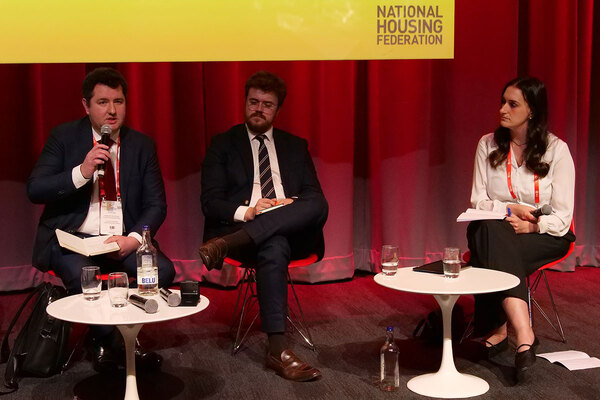Under the radar? Why housing providers need to talk about fraud
Data on the volume, types and cost of fraud to the social housing sector is hard to come by. Keith Cooper hears from providers and experts about why that matters – and what we do know about recent trends in fraudulent activity
-
Social Housing spoke to investigators, counter-fraud consultants, associations and regulators about how fraud is being detected and tackled
-
Housing providers are vulnerable to two key categories of fraud: corporate and tenancy
-
Fraudulent activity across all sectors is on the rise, suggesting that a paucity of data in social housing does not mean a paucity of crime
-
Few associations currently make use of Cabinet Office resources for tackling tenancy fraud
-
Meanwhile, associations with specialist fraud teams of their own have seen detection rates rise
Housing associations and council landlords are perfect targets for fraudsters in these financially straitened times.
It is not just that they have tonnes of data for cybercriminals to seize. Many of the innumerable multimillion-pound development deals they manage are vulnerable to scams by staff, contractors or collusions. That is before you start checking whether all the people in your homes are bona fide tenants. Is some of your rental income connected to a scam? You had better check.
So what are associations and other social landlords doing to avoid, detect and tackle fraud? To find out, Social Housing has spoken to investigators, counter-fraud consultants and associations that have recently concentrated resources on fraud.
We found that social landlords are vulnerable to two key categories of this crime. The first is the corporate kind and includes cybercrime (see box), bribery and collusion. The second big group is tenancy fraud, which covers illegal subletting and ‘succession fraud’, where someone takes over a tenancy they are not entitled to.
Most people we spoke to agreed that scams of all sorts were increasing in social housing, as in other sectors. But there is some disagreement about whether associations and the Regulator of Social Housing, in particular, do enough to deal with it, especially in relation to tenancy fraud.
Some suspect that tenancy fraud affects all social landlords. The National Fraud Authority (NFA) claimed that it costs the public purse £1.8bn each year, before the body closed in 2014. Meanwhile, the Tenancy Fraud Forum (TFF) last year calculated that 148,000 social homes in England were subject to it in some way.
One 50,000-home association told us it had seen a doubling of reported cases of fraud, including a “big increase” in tenancy fraud, such as illegal subletting. Another major landlord described a “significant increase in fraudulent succession applications”, a fifth of which it found to be fraudulent last year.
On the rise
“Fraud is on the rise without a shadow of a doubt,” says Martin Chapman, national head of forensic services at accountancy firm Crowe, referring to all sectors. “Reported cases of fraud are described as the tip of the iceberg,” he adds. “Being conservative, it’s probably about one-tenth of the problem.”
Fraud cost the UK £219bn last year, according to a study by Crowe and the University of Portsmouth’s Centre for Cybercrime and Economic Crime. This report does not include a figure specific to social housing and it has proven tricky to pin a reliable one down.
The Regulator of Social Housing (RSH) asks all of its 1,385 private registered providers to file fraud reports and allows them to do so in any way they like. But on average only 210 submit reports each year and some might be “nil returns”, the RSH confirmed. The regulator does not collate the data it has, so it has no figures on the number or value of frauds in the sector. It instead uses any fraud reports it receives as “intelligence” when investigating individual associations.
One housing association source told Social Housing that they believed the regulator was effectively “toothless” without access to meaningful data on fraud.
Asked if it considered collecting fraud data to be outside its remit, and whether this could be part of the problem, the RSH said: “Our standards make it clear that landlords are responsible for preventing fraud within their organisations, including tenancy fraud. The information submitted to us by landlords suggests that most social landlords manage fraud risks appropriately. In a small number of cases, landlords have not had appropriate controls in place and we have taken regulatory action against them.”
The number of council landlords reporting tenancy fraud has also plunged in recent years. All of them had to file fraud reports to the Audit Commission when it was around. When the commission closed in 2015, the Chartered Institute of Public Finance and Accountancy (CIPFA) began checking on council fraud but with a voluntary reporting scheme. As a result, participation levels fell through the floor. Only a quarter of authorities responded to CIPFA’s latest and apparently final fraud study in 2020. CIPFA has not responded to request for a comment.
£1.8bn
Annual cost of tenancy fraud
180,000
Social homes subject to tenancy fraud
216
Associations reporting fraud to the RSH in 2022-23
Sources: National Fraud Authority; Tenancy Fraud Forum; Regulator of Social Housing
Social landlords’ apparent reluctance to report fraud irks counter-fraud experts. It risks creating an unfounded impression that there is not much fraud in the sector, they say. A report by Tenet Law last year, entitled Fraud… Nothing to See Here!, claims that many associations are either “unconsciously” or “consciously” not dealing with fraud risk.
Arun Chauhan, fraud specialist at Tenet Law and co-author of the report, says the social housing sector “doesn’t seem to think that it suffers with fraud”.
“The regulator is not hearing from housing associations about the extent of fraud and it therefore doesn’t give a huge amount of attention to it,” he adds. “It makes it look like associations have got the secret sauce which other sectors do not know about, but which helps them to avoid all fraud. In a country where 41 per cent of all crime is fraud or cybercrime, it seems a huge anomaly.”
So without any reliable data from councils’ or the association’s regulator, what do we know about the extent of fraud in the sector? Again, this is a difficult question to answer.
The financial cost of corporate fraud in social housing rarely emerges and does so most often in details from court case reports. Recent ones include a collusion between two maintenance workers and an external contractor who defrauded Greenwich Council of just over £1.5m.
But only a fraction of fraudsters see the inside of a courtroom. “Police became involved in only four of the 50 investigations which I’ve been involved in,” says Crowe’s Mr Chapman. And associations are cautious about pursuing fraudsters in civil courts when there is little chance of recovering their lost cash, such as when gambling or alcohol addiction is involved.
Housing consultant James Tickell says it is also difficult to recover money from big corporate frauds when it is moved through international banks, such as in the Bahamas or Belgium. “I’d like to think that most people do get caught, but you can’t be sure, and the police are often reluctant to get involved,” Mr Tickell says.
Corporate frauds of up to six figures can also go under the radar without being picked up or reported by external auditors either. “Some of the major frauds we’ve seen are around the £100,000 mark,” says Michael Tourville, a partner at accountancy firm Beever and Struthers. “That isn’t a figure which is material to accounts; it isn’t going to make an association go bust and so won’t typically be picked up through external audit.”
Scams of this scale often leave no obvious stain in the paperwork, adds Lee Cartwright, a partner at the same firm. “Dodgy contractors might invoice £100 for something instead of £50. If it does this thousands of times, the amounts can be relatively significant. It can come from an approved contractor and is commissioned by and signed off by different people in the organisation. Sometimes there’s nothing to spot in the paperwork.”
Counting the cost of cybercrimes
“The cost of recovering from a serious cyber incident or fraud goes far beyond the obvious financial and operational costs to include potential legal costs and long-term reputational impact. Therefore, organisations must have strong governance processes in place to manage a response to an incident and test these so everyone involved knows their responsibilities. This can’t be simply left to the technologists in the organisation to manage.
“Social housing providers have become a target for cybercriminals due to the significant quantity of personal data they control and process on behalf of their residents and the importance to maintain operations on a 24/7 basis. This makes them particularly vulnerable to extortion via ransomware attacks.
“The types, sophistication and speed of attacks are forever increasing, which means it is important for social housing providers to understand what the emerging threats are so that they can remain resilient to them.”
Tim Robinson, director of cyber security and counter fraud, Crowe
Develop an anti-fraud culture
Associations can take steps to prevent fraud by pinpointing weaknesses and tightening processes and controls with internal audit. But even this has its limitations.
Mr Tickell, who has advised on many major frauds, says halfway decent controls should pick up small-scale scams by a fraudster working on their own. “But as soon as two or three people, particularly in different teams, are involved it can become more difficult to detect, as they can cover for each other,” he adds.
Tenet Law’s Mr Chauhan says internal controls and processes are also limited by the fact that they are circumnavigated by staff for convenience. “This can be to make their jobs easier or more efficient, but leaves gaps which others can exploit,” he adds. “Controls and checklists don’t protect against fraud when people go off script and fraud is about manipulating those controls,” he adds.
Fraudulent activities in social landlords are, in fact, most often brought to light by whistle-blowers. “When it comes to detecting specific frauds, it is very often someone seeing something that doesn’t smell right; they dig further, call us in, and then find out what actually happened,” says Mr Cartwright.
This key role of whistleblowing in uncovering fraud makes it essential that social landlords develop a “strong anti-fraud culture” that shows they take fraud seriously, says Tim Robinson, counter fraud director at Crowe. “It’s important… they fully investigate suspicions of fraud to recover any lost funds and set a deterrent to others.”
All the above limitations on detecting corporate fraud, alongside the absence of collated data from the RSH, make it impossible to put a price tag on corporate fraud in social housing.
Tenancy fraud
What is easier to identify is the likely scale of tenancy fraud. The TFF’s claims that 148,000 social homes in England are subject to some form of tenancy fraud is based on a methodology developed by Alan Bryce, former head of counter fraud at the Charity Commission, now a non-executive director at the TFF.
Mr Bryce says the commission’s spotlight on tenancy fraud had over a six-year period pushed tenancy fraud detection rates up threefold to 3,000 homes a year. He is frustrated by what he sees as a lack of attention now given to tenancy fraud. “There are some fantastic housing associations which do some absolutely remarkable detection work,” he adds. “But our evidence indicates that there are many housing associations that are doing little or nothing to effectively tackle it.”
Associations that have concentrated resources on tenancy fraud have seen a jump in detection rates and savings.
West Midlands-based Bromford has since 2021 seen a 100 per cent year-on-year increase in the number of properties it has recovered from tenancy fraudsters. “Many associations are very reactive in their response to tenancy fraud, but we’ve taken a different approach and looked at the proactive things we can do,” says Allan Maund, the association’s fraud, probity and insurance manager.
L&Q has recovered 179 social homes since establishing a five-strong fraud squad the same year, saving the public purse £7.5m. “Tenancy fraud has always been there, but in today’s climate, the need to deal with it is far greater than it has ever been,” says Nicola Evans, tenancy fraud manager at L&Q. And fellow G15 member Peabody says that its specialist tenancy fraud team saved taxpayers £2.5m last year. “In our experience, landlords with their own fraud teams tend to be more successful in identifying tenancy fraud and recovering homes,” a Peabody spokesperson says.
Even associations without dedicated tenancy fraud-busting teams have some potentially powerful tools at their disposal. One is the National Fraud Initiative (NFI), a data-matching exercise run by the Cabinet Office.
But vanishingly few associations use it. Only 16 have taken advantage of the NFI in the past five years. The amount of tenancy fraud it has helped the initiative identify is correspondingly small, and has halved in two years from £5.6m in 2020 to £2.3m in 2022 – as individual associations with specialist teams have seen detection rates rise. “We encourage housing associations to join the National Fraud Initiative as they have a vital role to play in combating social housing fraud,” a Cabinet Office spokesperson said.
Paul Roberts, former finance director at The Guinness Partnership, and now one of the troubleshooting board members drafted in to Rochdale Boroughwide Housing, is the other co-author of the Fraud… Nothing to See Here! report. He believes there are many good reasons housing associations should do more to tackle fraud.
“Associations may have a great story on fraud and if so, how best could we tell this story, perhaps through the Sustainability Reporting Standard?” he says. “But if not, what could we do to better safeguard our assets, our customers, and our reputations, as well as benefit from the money saved or recovered to invest in our businesses?”
He says board members should ask “sharper” and “challenging” questions of their executives. “If you’ve sent in nil returns on fraud to the regulator for the past five years, shouldn’t you pause to think about that for a second? Where is the conversation and the analysis? If there is fraud and we are leaking funds, why aren’t we getting that money back?”
Recent long reads from Social Housing
Waqar Ahmed’s parting request to the banking sector? ‘Take some more risk’
As he looks to step away from the financial helm of L&Q, 27 years after joining the group, Waqar Ahmed speaks to Sarah Williams about massive growth, major restructuring, Westminster’s “most stupid decision” and why the sector’s lenders must (finally) take on more risk
‘It was really the credit crunch that was our making’: Piers Williamson on two decades at THFC
After 22 years at the helm of sector bond aggregator The Housing Finance Corporation, Piers Williamson sits down with Sarah Williams to talk through two decades of turnaround, transactions and traversing market turbulence
‘It’s not something we would ordinarily do’: why the RSH made a payment to a failing provider
At the start of 2023, the English regulator exercised a power it had not used for more than two decades: it gave direct financial assistance to a struggling housing association by providing liquidity support. Sarah Williams reports
Devolution and housing in England – where are we now?
As the Labour government firms up plans for its next set of devolution deals, Social Housing looks at what settlements to date have meant for housing, and what is needed to do more. Robyn Wilson reports
Under the radar? Why housing providers need to talk about fraud
Data on the volume, types and cost of fraud to the social housing sector is hard to come by. Keith Cooper hears from providers and experts about why that matters – and what we do know about recent trends in fraudulent activity
Captive insurance: why more than 15 housing associations are exploring the approach
Michael Lloyd investigates what captive insurance entails and whether it could provide an answer to the sector’s challenges in this area, as Social Housing learns that at least 15 associations are exploring the approach
RELATED







